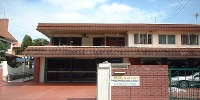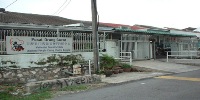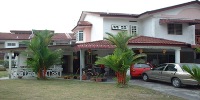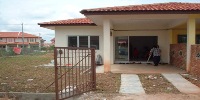The Department of Special Education established in 1995 looks into the needs of students who are blind, deaf and those with learning disabilities but exclude those who are physically handicapped with the mental ability to follow the normal curriculum and those with multiple disabilities, with "profound physical handicap or with severe mental retardation".
As a result, many students with mobility impairment who are able to attend mainstream schools are not being able to do so due to architectural barriers within the schools and many more disabled children not even considered for education.
VOCATIONAL TRAINING
Currently, there are a number of vocational training centres, run by both the government and NGOs, to cater to the training needs of people with disabilities. However, there is a need for more vocational training centres offering courses which teach skills that are more relevant in terms of providing employment opportunities such as IT and accountancy.
EMPLOYMENT
In 1989, the government announced that 1% of jobs in the public sector will be reserved for the people with disabilities. In 1990, the private sector was encouraged to do likewise. The Ministry of Human Resources has since helped out in the placement of people with disabilities in suitable jobs.
However, inspite of the incentives provided such as double tax deduction for the employment of disabled workers in the private sector, the quota is far from being filled.
The Progress Report (1996-2000) of the Mid-Term Review of the 8th Malaysia Plan revealed that only 3,489 jobs in the private sector and 536 in the public sector were offered to the disabled. More than 95% of people with disabilities are still unemployed.
HOUSING
Many disabled persons and their families face problems in obtaining affordable and appropriate housing due to poverty, non-enforcement of building by-laws requiring access and facilities for disabled persons, local authority requirements for low cost applicants which work against the disabled (eg applicants have to be married when many disabled are unable to find marriage partners due to prejudices) and outright discrimination faced by the disabled.
BUILT ENVIRONMENT
The Uniform Building By-Laws (1984) under the Street, Drainage and Building Act 1974 was amended in 1990.
It makes it mandatory for all new buildings to have facilities and amenities for people with disabilities. Subsequently, The Malaysian Standard (MS1184:91) Code of Practice for Access for the Disabled People to Public Buildings was drawn up to provide the specifications for the essential provisions that need to be incorporated into all buildings.
However, due to the lack of enforcement of the Act and Code of Practice, many buildings are still inaccessible to people with disabilities thereby preventing disabled persons from going to schools, to work, to go about their daily activities such as going to the post office, to banks, to the government offices, etc and from full participation in society.
TRANSPORTATION
Lack of accessible transportation appears to be one of the greatest problems faced by people with disabilities.
It should be recognised that providing accessible transportation benefits everybody, especially the growing number of elderly people and also parents with young children.
HEALTH AND MEDICAL CARE
- Appropriate treatment
- Rehabilitation hospital for persons with spinal cord injury and those who are chronically ill
- Rehabilitation aids and assistive devices
- Carer system should be organised to help relieve the burden of the families
FINANCIAL OF NGOs
NGOs have played a significant role in the development of social services in Malaysia. NGOs are also the major providers of services to people with disabilities and their families.
Due to financial shortage they have to dissipate their energy and resource raising funds from the public for most of their programmes and services instead of concentrating on the work for the disabled.






No comments:
Post a Comment